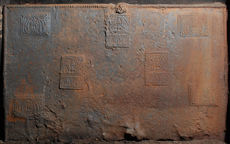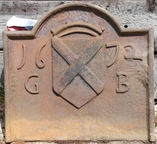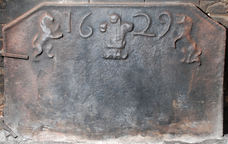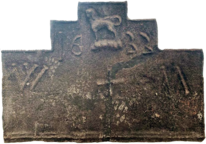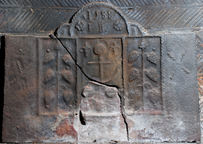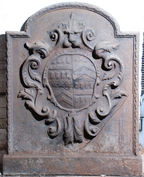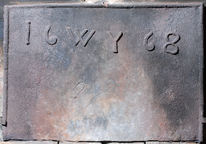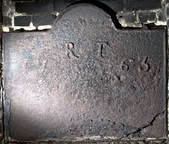-
241
Description: Rectangular; twisted rope edging (top and sides); irregular arrangement of two rectangular pastry stamps, each with a fleur de lys within fern leaves, and one with three additional fern leaves below; the smaller stamps form the four corners, with the larger stamp, three times, in a triangular pattern between.
Notes: Various excrescences on the plate were probably the result of careless pouring of the metal during casting.
- Decoration tags:
- rectangular (shape)
- rope (edging)
- simple stamps
- objects
Manufactured: in the mid- to late-16th century possibly at Pounsley Furnace, Framfield in the Weald area of England.
Current location: in private hands Kensington and Chelsea, London, England.
- Attached to series:
- Pounsley series
- Food mould stamp firebacks
-
242
Description: Arched rectangular shaped; astragal edging; shield bearing a saltire, beneath a baron’s coronet; date and initials split by shield.
Notes: The shield, coronet and initials may be those of George Nevill, 12th Baron Bergavenny (1665-95); the Neville arms has a rose in the centre but if the shield were a painted carving, the rose may have been painted and not carved.
Copies of this fireback are known.
Inscription: 16 72 / G B
Arms: George Nevill, 12th baron Bergavenny
- Decoration tags:
- rectangular with round arch (shape)
- carved stamps
- individual letters
- individual numbers
- text
Manufactured: in 1672 possibly in the Weald area of England.
Current location: Fulham, London, England.
- Attached to series:
- Bergavenny firebacks
- Personal armorial firebacks
-
244
Description: Canted rectangle; twisted rope edging (top and sides); stamp of three ostrich feathers within a coronet, between the two parts of the date, with lion and unicorn supporters outside date.
Notes: The ostrich feathers are the badge of the Prince of Wales. There is no known significance of the year 1629 with that title, the birth of the prince (later Charles II) being in the following year. The date was probably added to a recasting of the plate. The lack of detail in the modelling indicates this has been recast several times.
Copies of this fireback are known.
Inscription: 16 29
- Decoration tags:
- rectangular with canted top corners (shape)
- rope (edging)
- carved stamps
- individual numbers
- heraldic
- text
- animals
Manufactured: in 1629 in the Weald area of England.
Current location: in private hands, Chailey, East Sussex, England.
Citation: Lloyd, N., 1925, 'Domestic Ironwork I', Architectural Review, 58, pp. 58-67.
- Attached to series:
- Prince of Wales' feathers series
- Prince of Wales firebacks
-
1034
Description: Canted rectangular shape; twisted rope edging in short lengths (top and sides); shield stamp with rebated edges repeated five times (two and three).
Notes: The arms are those of Courthope of Whiligh in Ticehurst; blazon: argent, a fess azure between three estoiles sable (two and one). Shown are molets of six points which have straight rays instead of (properly) estoiles which have wavy ones. However, the 1643/4 iron graveslab of David Barham of Snape, in Wadhurst church, has the same arms (also with molets instead of estoiles), which were those of his mother who was a Courthope.
Arms: Courthope, of Whiligh in Ticehurst
- Decoration tags:
- rectangular with canted top corners (shape)
- rope (edging)
- carved stamps
- heraldic
- armorial
Manufactured: in the late-16th to early-17th century in the Weald area of England.
Current location: Fulham, London, England.
- Attached to series:
- Personal armorial firebacks
- Courthope arms series
-
1255
Description: Rectangular with two-stepped top; twisted rope edging (top and sides), reused frame moulding at bottom; top centre, stamp formed of a talbot statant guardant upon a wreath between separated date; initials formed of straight twisted rope lengths separated between lower shoulders; a cross below the crest.
Notes: Straight elements in the letters and numbers are formed of short lengths of twisted rope; curved elements appear to have been formed by hand drawing in the casting sand; the talbot crest has been seen on other firebacks indicating a common source, and is associated with firebacks with a stepped shape. Chard Auctions, 16 Mar 2023, lot 206 (£85, with two other firebacks).
Inscription: 16 33 / W + M
- Decoration tags:
- stepped (shape)
- rope (edging)
- simple stamps
- carved stamps
- individual letters
- individual numbers
- heraldic
- text
Manufactured: in 1633 in the Weald area of England.
Current location: not known.
- Attached to series:
- Stepped firebacks
- Talbot crest series
-
245
Description: Arched rectangular shaped with narrow shoulders; fillet edging; date in individual numerals across arch.
Notes: A larger version is different in the spacing of the numerals and the proportions of the plate. For another casting of this fireback see J. Every Collection catalogue #20 (Sussex Archaeological Society library, Barbican House, Lewes, Sussex).
Copies of this fireback are known.
Inscription: 1658
- Decoration tags:
- rectangular with round arch (shape)
- rope (edging)
- carved stamps
- individual numbers
- text
Manufactured: in 1658 possibly in the Weald area of England.
Current location: Lytes Cary Manor, Charleton Mackrell, Somerset, England.
Museum number: 254606 (part of the National Trust museum group)
- Attached to series:
- 1658 arched series
- Date only firebacks
-
247
Description: A modified recasting of a variant of the ‘Armada’ fireback, with initials changed to IK, a single anchor panel, and the addition of a plain base and borders, the latter each with a twisted rope saltire, upper middle.
Notes: It is likely that an original four-panel fireback has been used to recast a copy with additional side and base panels; the saltires may have apotropaic significance. A second fireback at the house cast in the 19th century is identical but for being 1% smaller all round, and has a full-width extension on top bearing four symmetrical rope saltires, the outer two larger than the inner two. The first example was used to make the second.
Inscription: 1588 / IK
- Decoration tags:
- rectangular with round arch (shape)
- simulated rope (edging)
- simple stamps
- carved pattern panels
- composite
- extension panels
- apotropaic
- text
- plants
- objects
Manufactured: in the 17th century in the Weald area of England.
Current location: Chawton House, Chawton, Hampshire, England.
- Attached to series:
- Armada series
-
34
Description: Arched rectangular shape; astragal and fillet edging (top and sides) with overlapping leaf pattern; floral cartouche with lion’s face at top, enclosing a shield bearing the arms of May (Gules, a fess between eight billets Or) quartering Broadnax (Or, two chevrons gules, on a chief of the last three cinquefoils Argent); at base a plain cuboid plinth.
Notes: Thomas Broadnax (1701-81), son of William Broadnax of Godmersham, Kent, and Anne May, heiress of Christopher May, inherited the estate of his cousin, Sir Thomas May, adopting his surname in 1727. He later changed his name to Knight on inheriting the estate of that family at Chawton in 1738.
Arms: May quartering Broadnax
- Decoration tags:
- rectangular with round arch (shape)
- astragal & fillet (edging)
- carved pattern panels
- armorial
Manufactured: in the early-18th century possibly in the Weald area of England.
Current location: Chawton House, Chawton, Hampshire, England.
- Attached to series:
- Personal armorial firebacks
-
255
Description: Rectangular; twisted rope edging (top and sides); along upper half of plate, date split with initials in between.
Notes: The initials are likely of William Yalden (d.1674), an ironmaster who was active in north-west Sussex and south-west Surrey where this and other similar firebacks have been noted.
Inscription: 16 WY 68
- Decoration tags:
- rectangular (shape)
- rope (edging)
- individual letters
- individual numbers
- text
Manufactured: in 1668 in the Weald area of England.
Current location: Ramster, Chiddingfold, Surrey, England.
- Attached to series:
- William Yalden series
-
1298
Description: Arched rectangular shape; astragal edging (top and sides); top centre, initials RT, widely split date below.
Notes: Simple fireback with a pair of initials and date. The '3' of the date is from a different set of numerals from the others.
Inscription: RT / 17 63
- Decoration tags:
- rectangular with round arch (shape)
- astragal (edging)
- carved stamps
- individual letters
- individual numbers
- text
Manufactured: in 1763 possibly in the Weald area of England.
Current location: Farley Farmhouse, Muddles Green, Chiddingly, East Sussex, England.
- Attached to series:
- Date & initials firebacks
